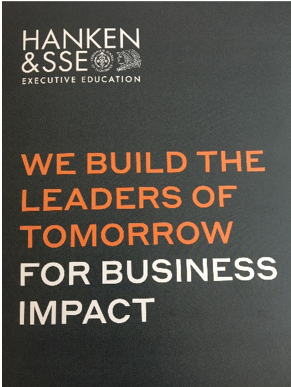
Last week I was invited as one of the speakers to hold a session on sales and customer experience for a group of talented international participants of the Integration Programme Business Lead, run by Hanken & SSE Executive Education. When I arrived to the classroom, I found a folder with an agenda for the day on my table. The text on the folder said: “We build the leaders of tomorrow for business impact”. It got me thinking which dialogue I, as a researcher, should bring from the academic world into the classroom. Obviously, it had to be relevant for the participants of the program in their future work life and have a business impact.
The Business Lead Programme is an integration programme, providing a fast-track into Finnish working life for refugees and immigrants who have degrees from abroad. First, the students attend four live modules addressing the Finnish and European business landscape and organizational culture, strategic leadership, finance, and a sales and service mindset. Then, the classroom sessions are followed by a 3-month internship where the participants have an opportunity to apply the new knowledge.
As a foreigner myself, I particularly enjoyed being a part of this integration programme. Having experienced what it is like to establish oneself as an expert in a new country, I was happy to get onboard. Together with my CERS colleague, Pia Polsa, we shared CERS’s customer-focused perspective on doing marketing and sales with the students within one of the four live modules.
During my afternoon session on sales and customer experience, I particularly wanted to share the service logic perspective with the participants on the sales process and sales activities I take in my research. With my presentation, I wanted to acknowledge how important it is for a business to understand the customer and its needs and be customer-oriented in its processes. During the session together with the participants, we had a chance to elaborate on the steps the customer goes through in the buying process and how a business-to-business setting is different from the business-to-consumer setting. We also had an opportunity to discuss the customer journey and different interactions between the company and the customer on this journey.
With these insights in mind, we then discussed the sales process and selling activities and how these can become more customer-oriented. The participants also had an opportunity to apply what we discussed to the business projects they have been working on during the programme. It was great to see how application of customer-oriented approach brought an additional nice touch to the projects.
Overall, it has been a wonderful experience to be a part of this programme, which contributes to Finnish business and society in such a meaningful way. It was great to share my research perspective with the programme participants as well. I hope that my session, at least on a small scale, has contributed to building the leaders of tomorrow.
Anna Abramova
Doctoral Student
